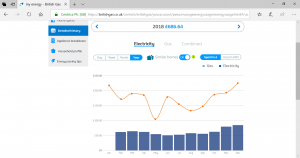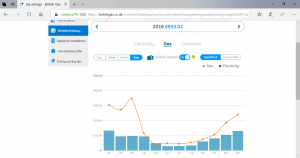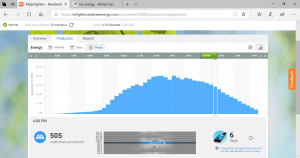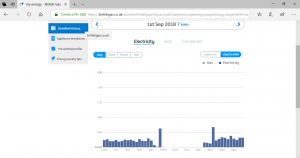Price caps appreciated
I live in the UK, which is lovely in the fact that no two months are precisely the same in terms of weather and our flora and funa respond to that. In the summer, we have amazing blooms, the crops grow tall, etc, etc.
It makes budgeting your household bills non-trivial. Even our esteemed meteorologists strangle with predictions on how cold it’s going to be from one day to the next.
If you are watching every penny to make ends meet, it can be a real worry to turn up the heating to cope with a cold snap. The government chose to help everyone by introducing a price cap to ensure that the private market did not run wild. I do believe in free markets but regulation to ensure natural monopolies and cartels due not form for essential services, such as power and water is the best of entrepreneurship and government owned businesses which can stagnate.
One of the things we get from our supplier is a comparison between our energy use and comparable houses (in terms of age, size and number of occupants).
Electricity wise, we do very well considering we have a work at home adult and run an electric car!
We do have solar panels mitigating some of these behaviours but even so, we’re using a good 60% less than the average in the area and our usage a month last year was between 275 and 467 kWh, an average of 354kWh. Our annual total last year was 3.893MWh.
Our gas usage is really low over the winter (I’m guessing our thermostat usage, zone management and insulation help here) and while we’re a little high in the summer at 507kWh, our highs are significantly better than average maxing out at 3257kWh in January. Our average is 1.756MWh with an annual total of 21.075MWh.
All fine and dandy, so what?
Good question.
The reason I’m writing this today is with the UK leaving the European Union is there are going to be some big questions asked about the average footprint in the developed economies, including the UK.
Sales of diesel cars have plummeted and petrol car sales have stagnated. Congestion is a big issue in most towns in the UK, so the obvious answer of buying an electric car to save some cash and avoid the penalties likely to be levied toward ICE is not a long term strategy.
The UK looked at removing some of the incentives towards micro-generate of energy in terms of the feed in tariffs for solar cells: the consensus was it was too early to do that.
Looking at the charts above, we’re a long way from generating all our electricity requirements from our solar cells (we generated 3.4MWh last year, so our total energy bill should have been 7.293MWh) and we’re feeding the majority of that back into the grid because it’s being generated when we don’t really need it. Take our give and take graphs below:
While we’re generating our peak, we’re not really making use of it (my husband tends to have a cold lunch for example).
So, if there’s no feed in tariff, it makes little sense to not store what we’re not using.
Batteries are not that efficient though, are they, especially per kWh?
They don’t need to be, if they are priced effectively. There’s also the question of whether or not we’d make more use of solar water heating and extra voltaic cells too.
Smart homes could power the big items, like the dish washer and the washing machine while peak power is being generated from the solar cells rather than manually spotting the correlations – a quick wash uses far less power than a 60ºC 2 hr one for example.
A third of all businesses in the UK are now generating their own power and smart use of heating and lighting is helping many reduce their bills. The UK finally produced more power by renewables than fossil fuels in 2018 (just).
We’re keen on the idea of combined heat and power in the home, but there are ground pump sources too.
My next big project is the use of EvoHome to help reduce our gas usage some more. The beauty of that system is we’d zone the upstairs which has 10 radiators managed as a single zone today.
Energy sources in the UK
It’s easy to think of solar as being the only renewable used in the UK. Actually we have a long history of harnessing much more than daylight:
- Nuclear (21%)
- Wind (15%)
- Solar (4%)
- Hydroelectric (2%)
- Gas, coal and other (58%)
(These numbers came from various sources on the internet).
Posted: January 15th, 2019 under 42.




